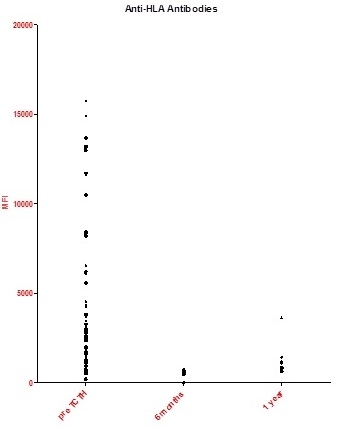Anti-HLA Antibodies in Allogeneic and Autologous Hematopoietic Stem Cell Transplantation.
Kidney Transplantation, Hematology, Histocompatibility Laboratory, Hospital Israelita Albert Einstein, Sao Paulo, Brazil.
Meeting: 2016 American Transplant Congress
Abstract number: C15
Keywords: Histocompatibility, HLA antibodies, Sensitization, Stem cells
Session Information
Session Name: Poster Session C: Antibody Mediated Rejection: Session #1
Session Type: Poster Session
Date: Monday, June 13, 2016
Session Time: 6:00pm-7:00pm
 Presentation Time: 6:00pm-7:00pm
Presentation Time: 6:00pm-7:00pm
Location: Halls C&D
Introduction: Anti-HLA antibodies have been associated with graft rejection in solid organ and hematopoietic stem cell transplantation (HSCT). The aim of this study was describe the profile of these antibodies after HSCT in order to understand its dynamic.
Methods: 33 patients submitted to HSCT at Hospital Israelita Albert Einstein were tested prospectively between March 2013 and December 2015 for the presence of anti-HLA Class I and Class II antibodies in the peripheral blood. We used multianalyte bead assays performed on the Luminex platform (Luminex, Austin, TX) including LABScreen PRA for screening and LABScreen mixed methods for quantify antibodies. We tested blood samples in different periods of HSCT time: pre conditioning chemotherapy, pre HSCT, and until 1 year post HSCT.
Results: 11 out of 33 patients were allosensitized: 8 were submitted to allogeneic and 3 to autologous HSCT. Anti-HLA antibodies decreased slightly post conditioning chemotherapy and before HSCT in 3 patients and was equal in 1 patient (2 patients didn´t have samples pre conditioning to be analyzed) (p<0,04, p<0,002, p< 0,0001 and p< 0,69, respectively). At 1 year post HSCT, anti-HLA antibodies decreased dramatically in 5 patients (Figure 1) (p<0,001) except in one patient in which they increased (an autologous HSCT for Multiple Sclerosis). 5 patients died by allogeneic HSCT complications before complete 1 year of the study and were removed from analyses.
Conclusion: The profile of anti-HLA antibodies changed post HSCT, both in autologous and allogeneic, from high mean fluorescence intensity (18170 MFI) to very low levels, sometimes to zero. Therefore, HSCT before solid organ transplantation could be a light in the end of tunnel for allosensitized recipients.

CITATION INFORMATION: Bertocchi A, Requiao-Moura L, Torres M, Tonato E, Durao Junior M, de Matos A, Hamershclak N, Pacheco-Silva A. Anti-HLA Antibodies in Allogeneic and Autologous Hematopoietic Stem Cell Transplantation. Am J Transplant. 2016;16 (suppl 3).
To cite this abstract in AMA style:
Bertocchi A, Requiao-Moura L, Torres M, Tonato E, Junior MDurao, Matos Ade, Hamershclak N, Pacheco-Silva A. Anti-HLA Antibodies in Allogeneic and Autologous Hematopoietic Stem Cell Transplantation. [abstract]. Am J Transplant. 2016; 16 (suppl 3). https://atcmeetingabstracts.com/abstract/anti-hla-antibodies-in-allogeneic-and-autologous-hematopoietic-stem-cell-transplantation/. Accessed February 23, 2026.« Back to 2016 American Transplant Congress
